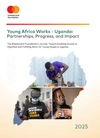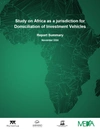The Mastercard Foundation Scholars Program at CAMFED Ghana is a 10-year partnership between the Mastercard Foundation and CAMFED Ghana. It seeks to provide comprehensive education support to academically gifted young women who face social and economic barriers and come from rural communities within CAMFED’s operational regions. A key objective of the Program is to unlock the potential of a critical mass of young women through secondary and tertiary education, as well as enrichment and service leadership opportunities.
In 2012, the Mastercard Foundation Scholars Program at CAMFED Ghana was launched to support girls and young women in their pathways to dignified and fulfilling work. The goal of the Program at CAMFED Ghana was to provide comprehensive support to 4,000 girls through Senior High School (SHS) and 2,000 young women through tertiary education and empower them with the necessary skills to become leaders of change. The Mastercard Foundation Scholars were selected from 32 districts across 12 regions of Ghana.
The Mastercard Foundation Scholars Program at CAMFED Ghana provided full scholarships, psychosocial support services, personal development support, career services, networking opportunities, and leadership development training to girls and young women. The Program also created pathways for the Mastercard Foundation Scholars’ transition to jobs, entrepreneurship, or further education. The Mastercard Foundation Scholars gained skills, values and competencies needed to succeed in the economy and make positive social impacts in their communities. Secondary and tertiary students were also given necessary provisions, on top of boarding and tuition fees being covered, as part of the scholarship’s comprehensive package.
Additionally, the Mastercard Foundation Scholars Program at CAMFED Ghana aimed to strengthen the education system in Ghana. To achieve this goal, CAMFED Ghana worked with secondary schools, tertiary institutions, the Government, and other stakeholders to design interventions that would create a more supportive environment in which all young people, including marginalized girls and women, could thrive.
Impact study of the Mastercard Foundation Scholars Program at CAMFED Ghana
To evaluate the overall impact, sustainability, and learning associated with the Program interventions over the past ten years, CAMFED commissioned a strategic consulting firm to conduct a Learning and Impact Assessment of the Mastercard Foundation Scholars Program. Specifically, the study aimed to evaluate the overall impact, sustainability, and learning associated with the Program interventions over the past ten years. The study was conducted in Accra and Tamale in eight districts which were purposively selected. This included four districts in southern Ghana and four districts in the northern zone.
The study used a mixed approach to collect data, and this involved various methods such as Key Informant Interviews (KIIs), Focus Group Discussions (FGDs), a mini-survey, and the Journey Pathway Mapping (JPM) exercise. The research team conducted 32 KIIs and 6 FGDs with 48 female Mastercard Foundation Scholars from the Mastercard Foundation Scholars Program at CAMFED Ghana. Additionally, 20 Mastercard Foundation Scholars participated in the Journey Pathway Mapping exercise where they graphically mapped out their educational and life journeys. The research team also administered a mini survey online to 696 Mastercard Foundation Scholars. Overall, the study involved a total of 796 respondents.
The study also incorporates a review of the Ghana element of CAMFED’s separate, but closely linked, 2016 partnership with the Mastercard Foundation, Young Women’s Successful Transitions, which also supported Mastercard Foundation Scholars at the secondary school level, as well as their post-school transitions and entrepreneurship in Ghana.
Some of the key findings from the study which demonstrate life-long impact at individual, family, community, and system levels include the following:
-
The study indicates that the Mastercard Foundation Scholars faced a multitude of challenges before their enrolment in the Mastercard Foundation Scholars Program at CAMFED Ghana. These challenges comprised a range of socio-cultural and economic factors that had a significant impact on girl’s and young women’s ability to access education and achieve academic success while also undermining their overall well-being.
-
The study also revealed that some of the Mastercard Foundation Scholars were at risk of being forced into early marriages by their families and relatives owing to the financial difficulties they faced. This was because the dowry obtained from a girl’s marriage would be utilized to either feed or educate her siblings.
-
The Mastercard Foundation Scholars Program at CAMFED Ghana aimed to produce a cohort of next-generation female leaders, promoting social transformation and economic growth in Ghana. The study observed several significant medium to long-term changes among the Mastercard Foundation Scholars, their families, communities, and educational institutions, toward the achievement of this goal.
-
The Program enhanced access to quality education for Mastercard Foundation Scholars from vulnerable backgrounds despite the various challenges that confronted their education. Through the Program, 4,032 secondary school Mastercard Foundation Scholars and 2,140 tertiary Mastercard Foundation Scholars were supported to access education.
-
The scholarship package alleviated the burden on both the Mastercard Foundation Scholars and their parents/guardians, creating an enabling environment for girls to excel in their studies. The support at both senior high school and tertiary levels led to improved retention, transition, and progression of the young women in the selected regions.
-
The Program played a significant role in supporting the Mastercard Foundation Scholars’ transition into dignified and fulfilling livelihoods through further education, entrepreneurship, and employment. It also enhanced the employability of the young women through the acquired qualifications and skills.
-
The study established that there was a sense of agency among the Mastercard Foundation Scholars to give back to their community, having been taught that they all had something to offer. The Program also nurtured Mastercard Foundation Scholars’ “giving back” attitude toward other vulnerable girls.
-
Teacher Mentors, University Patrons, and District Education Committee (DEC) members expressed deep appreciation for the Program. As stakeholders in the Program, these actors reported having enhanced knowledge and skills in mentorship, safeguarding, and leadership matters as well as increased zeal and enthusiasm to give back to society as was learned in the engagement and work with the Program.
-
In terms of policy and practice, the Mastercard Foundation Scholars Program at CAMFED Ghana made significant contributions to the policy environment in Ghana, especially in the education sector. Through the program, some institutions, especially tertiary institutions, are now more open to issues related to gender and inclusion.
-
Within the policy space, the Mastercard Foundation Scholars Program at CAMFED Ghana also had a positive influence on CAMFED’s Learner Guide Program, the formation of the Girls’ Education Network, girls’ club activities in schools, and development of the re-entry policy for girls who become pregnant in school.
Some of the key lessons learned from the study which have policy implications include the following.
-
Supporting girls and young women facing social and economic barriers with appropriate resources and targeted support can position them to thrive and excel academically, in livelihoods, and as leaders of change.
-
Holistic support to girls unlocks greater potential. Complementing the material support provided, the enrichment components of the Mastercard Foundation Scholars Program at CAMFED Ghana designed to build confidence and skills are key to ensuring the holistic development of young people.
-
There is immense power in positioning females as role models in communities, including young women living with disabilities. This contributes to positive changes in family and community attitudes and norms for girls’ education, women’s livelihoods, and leadership.
-
There is a need to intervene early in girls’ education to tap into their potential while still young – this yields better results than waiting to onboard them at the tertiary level and also ensures greater inclusion.
Overall, the ten years of the Mastercard Foundation Scholars Program at CAMFED Ghana demonstrates the value of investing in the education of women and girls, and of building an ecosystem of support around them that engages families, communities, educational institutions, and policy-makers. The Mastercard Foundation Scholars have achieved remarkable outcomes and have stepped up as agents of change for the next generation.




